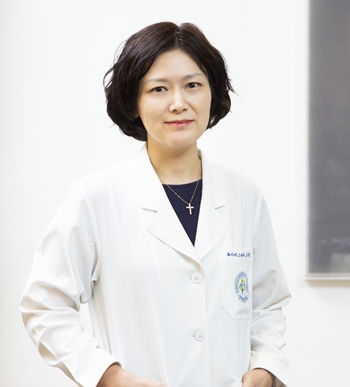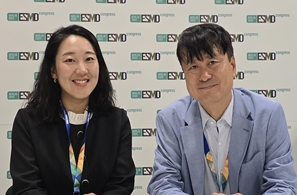- More treatment options for rheumatoid arthritis available
- by Hwang, Byung-woo | translator Kang, Shin-Kook | Sep 5, 2024 05:51am
Rheumatoid arthritis is caused by abnormally activated immune cells attacking joints, thereby inducing inflammation and pain. If not treated early, repeated inflammation over time could result in joint deformities and loss of function.
Along with improved disease awareness, physicians are provided with more treatment options that they can use. For example, Janus Kinase (JAK) inhibitors brought a paradigm shift to rheumatoid arthritis treatment.

Recently, JAK inhibitors have been used as a vital treatment option for patients with rheumatoid arthritis and ankylosing spondylitis.
Kim explained, "Rheumatoid arthritis occurs when autoimmune reactions cause inflammation in the thin tissue lining of joints. As a result, damages to cartilages and bones surrounding the joints lead to loss of joint function, causing permanent dysfunctions." Kim added, "JAK inhibitors that can be orally administered and have almost similar effects now enable patients to manage arthritis effectively."
However, concerns for 'safety' were raised after JAK inhibitors were reported to come with adverse cardiovascular events in 2021.
At that time, the U.S. Food and Drug Administration (FDA) cautioned that JAK inhibitors have the risk of cardiac disorders and cancer. The Ministry of Food and Drug Safety (MFDS) in South Korea also distributed safety documents. Ultimately, the U.S. FDA decided to add a new black box warning to JAK inhibitors, citing major adverse cardiovascular events (MACE), thrombosis, and death.
Although a causal association between the drug and adverse reactions has not been demonstrated, the safety issue of JAK inhibitors has not bee resolved. Because of this, warnings have been issued to clinical practices.
Regarding this matter, Kim emphasized the individualized treatment regimem to consider each patient's condition. This means that the selection of drugs cosidering an individual's condition is crucial.
Kim said, "For patients who are at high risks, such as those who are seniors, have tumors, or have cardiovascular diseases, drugs with different mechanisms of actions is considered first ahead of the use of JAK inhibitors," and added, "Because JAK inhibitors could increase the risk for infections, especially shingles, various immunizations are recommended to prevent such infections before the use of the drug. Vaccines for pneumonia, shingles, and influenza could be considered, and patients with latent tuberculosis must undergo prior treatment."
"Special exemption of calculation provisions must be improved for rheumatoid arthritis"
When asked if there could be system-wise improvements, Kim mentioned a 'special exemption of calculation provisions' of the National Health Insurance system.
Rheumatoid arthritis is caused by autoimmune reactions of immune cells against specific proteins in the body. It is known that rheumatoid factor and anti-CCP antibodies are the leading causes of the disease.
Rheumatoid factor or anti-CCP antibodies are found in 70-80% of all patients with rheumatoid arthritis. The remaining patients who do not have those factors are categorized as seropositive and seronegative rheumatoid arthritis.
Previous studies have shown that seropositive rheumatoid arthritis patients tend to have more severe disease and poorer prognosis compared to seronegative patients. As a result, when 'special exemption of calculation provisions' was implemented, only seropositive patients received the benefits.
In other words, seronegative patients, nearly 20% of all patients with rheumatoid arthritis, do not benefit from 'special exemption of calculation provisions.'
Kim said, "Unfortunately, approximately 20% of rheumatoid arthritis patients are excluded from receiving 'special exemption of calculation provisions' for severe diseases because they test negative for rheumatoid factor and anti-CCP antibodies. As a result, the treatment costs a lot." Kim added, "There should be systemic improvements to ensure these patients are also included in the special provisions."
"Currently, biological agents and targeted synthetic anti-rheumatic drugs can only be used at least six months after the first-line treatment, which limits the ability to provide early and aggressive treatment," Kim added. "There is a need to ease the reimbursement criteria for drug use based on physicians' clinical decisions."
Lastly, Kim emphasized the importance of early diagnosis of rheumatoid arthritis and complications management.
Kim explained, "Big differences in prognosis are reported between patients who dive into treatment after early diagnosis and those who have delayed diagnosis and treatments over two years. Individuals who have experienced unexplained small joint swelling and pain over six months are recommended to see physicians," and added, "The most common cause of death of patients with rheumatoid arthritis is surprisingly cardiovascular disease. Assessment of the risk of disease-related complications and an appropriate treatment addressing these risks are important."
Lastly, Kim advised, "Patients who receive treatment earlier have a good prognosis, and drugs with different mechanisms of action are currently available, as well as drugs under development," and added, "Patients who are diagnosed with rheumatoid arthritis do not need to be afraid nor be disappointed, and I wish the best for patients to live healthy lives by seeking treatments proactively."
-

- 0
댓글 운영방식은
댓글은 실명게재와 익명게재 방식이 있으며, 실명은 이름과 아이디가 노출됩니다. 익명은 필명으로 등록 가능하며, 대댓글은 익명으로 등록 가능합니다.
댓글 노출방식은
댓글 명예자문위원(팜-코니언-필기모양 아이콘)으로 위촉된 데일리팜 회원의 댓글은 ‘게시판형 보기’와 ’펼쳐보기형’ 리스트에서 항상 최상단에 노출됩니다. 새로운 댓글을 올리는 일반회원은 ‘게시판형’과 ‘펼쳐보기형’ 모두 팜코니언 회원이 쓴 댓글의 하단에 실시간 노출됩니다.
댓글의 삭제 기준은
다음의 경우 사전 통보없이 삭제하고 아이디 이용정지 또는 영구 가입제한이 될 수도 있습니다.
-
저작권·인격권 등 타인의 권리를 침해하는 경우
상용 프로그램의 등록과 게재, 배포를 안내하는 게시물
타인 또는 제3자의 저작권 및 기타 권리를 침해한 내용을 담은 게시물
-
근거 없는 비방·명예를 훼손하는 게시물
특정 이용자 및 개인에 대한 인신 공격적인 내용의 글 및 직접적인 욕설이 사용된 경우
특정 지역 및 종교간의 감정대립을 조장하는 내용
사실 확인이 안된 소문을 유포 시키는 경우
욕설과 비어, 속어를 담은 내용
정당법 및 공직선거법, 관계 법령에 저촉되는 경우(선관위 요청 시 즉시 삭제)
특정 지역이나 단체를 비하하는 경우
특정인의 명예를 훼손하여 해당인이 삭제를 요청하는 경우
특정인의 개인정보(주민등록번호, 전화, 상세주소 등)를 무단으로 게시하는 경우
타인의 ID 혹은 닉네임을 도용하는 경우
-
게시판 특성상 제한되는 내용
서비스 주제와 맞지 않는 내용의 글을 게재한 경우
동일 내용의 연속 게재 및 여러 기사에 중복 게재한 경우
부분적으로 변경하여 반복 게재하는 경우도 포함
제목과 관련 없는 내용의 게시물, 제목과 본문이 무관한 경우
돈벌기 및 직·간접 상업적 목적의 내용이 포함된 게시물
게시물 읽기 유도 등을 위해 내용과 무관한 제목을 사용한 경우
-
수사기관 등의 공식적인 요청이 있는 경우
-
기타사항
각 서비스의 필요성에 따라 미리 공지한 경우
기타 법률에 저촉되는 정보 게재를 목적으로 할 경우
기타 원만한 운영을 위해 운영자가 필요하다고 판단되는 내용
-
사실 관계 확인 후 삭제
저작권자로부터 허락받지 않은 내용을 무단 게재, 복제, 배포하는 경우
타인의 초상권을 침해하거나 개인정보를 유출하는 경우
당사에 제공한 이용자의 정보가 허위인 경우 (타인의 ID, 비밀번호 도용 등)
※이상의 내용중 일부 사항에 적용될 경우 이용약관 및 관련 법률에 의해 제재를 받으실 수도 있으며, 민·형사상 처벌을 받을 수도 있습니다.
※위에 명시되지 않은 내용이더라도 불법적인 내용으로 판단되거나 데일리팜 서비스에 바람직하지 않다고 판단되는 경우는 선 조치 이후 본 관리 기준을 수정 공시하겠습니다.
※기타 문의 사항은 데일리팜 운영자에게 연락주십시오. 메일 주소는 dailypharm@dailypharm.com입니다.









